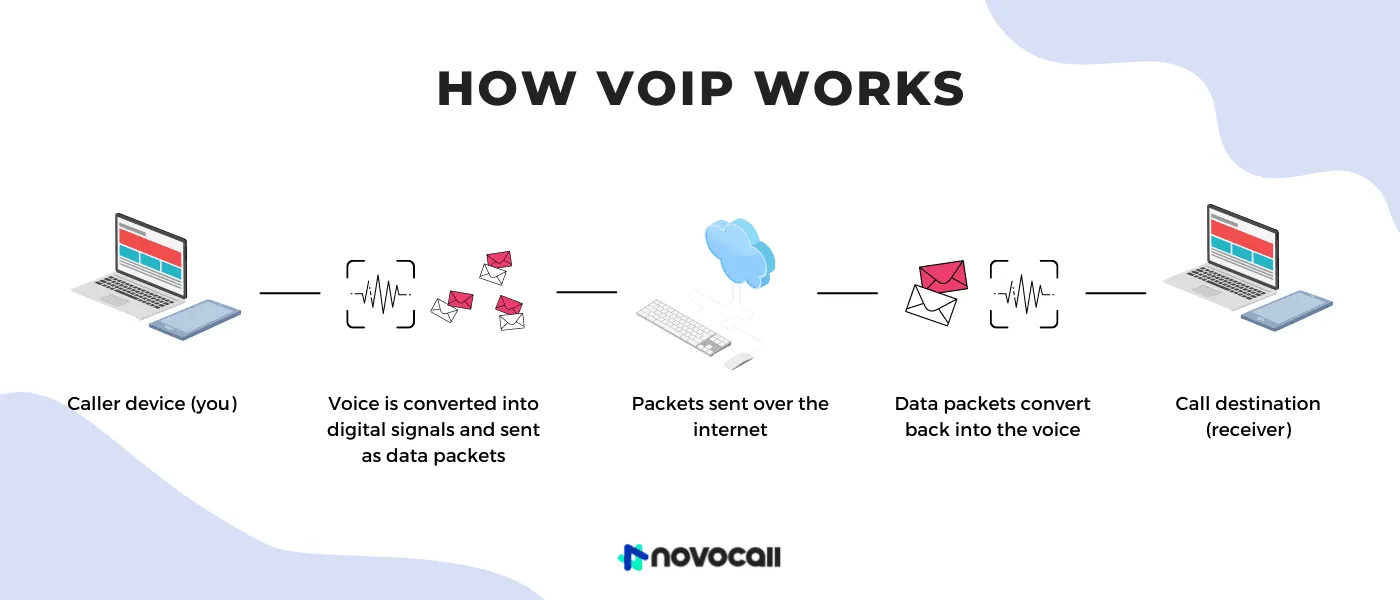


Start driving better conversations.
Novocall will be your new favorite business phone system.


Content Writer
Business communication is increasingly developing and more technologies are tirelessly working to scale up the current capabilities of their business phone systems.
Today, more businesses are switching from dated technologies like Primary Rate Interface (PRI) to more advanced internet technologies.
Voice over Internet Protocol (VoIP) and Session Initiation Protocol (SIP) are becoming better alternatives because of better services, lower costs, and robust communication capabilities.
With over 77% of customers preferring to use phone calls over other mediums, VoIP is increasingly becoming an internet-based preference for voice communication.
While VoIP is best for some companies, many others choose SIP to benefit from its unified communication approach that supports more than just voice.
If you are evaluating the right phone system for your business and find it challenging, fret not! This post will help you break down the difference between VoIP and SIP. Let’s dive right in!
Session Initiation Protocol (SIP) is an internet communication technology used for managing media communication sessions.
SIP is used to set up, maintain, and end connections which include voice, video, and messaging applications from different phone systems.
It’s a unified communication tool that controls and enhances VoIP capabilities for businesses to enjoy the swift collaboration that could otherwise be impossible with VoIP alone.
SIP also provides SIP trunking, a feature that will allow you to connect to other phone networks even when their internet connection is disconnected.
Voice over Internet Protocol (VoIP) is an internet communication technology that allows voice communication over the internet. VoIP is simply a broad term that refers to all internet-based phone calls where users can make and receive voice calls over the internet.
The way VoIP works is simple. Firstly, the VoIP system will convert your voice into digital signals. Then, this system sends over those signals through the internet in bits called data packets.
Finally, the packet destination platform receives your data signals, and the VoIP system converts them back into voice.
Here’s a visual breakdown of what we just mentioned:

Many phone systems use VoIP across devices with internet access to allow businesses to connect with their customers and leads. You can check out the best providers here.
Though VoIP does not need SIP to work, having SIP with VoIP can snowball its capabilities.
Differentiating between the two is challenging as the two are closely correlated — SIP works with other protocols that require VoIP to work, yet both do not need each other to function independently.
The two terms are so tightly interwoven that many people even consider them synonyms. However, they are not the same.
So, let’s dive deeper into more details with the following differentiating factors:
While integration is possible with both VoIP and SIP, there is an edge to how many services you can effortlessly integrate with VoIP over SIP.
SIP can seamlessly integrate with multiple cloud applications, existing PRI lines, and more built-in applications.
VoIP integrations are straightforward as many phone system providers offer extreme user-friendliness for their administrative tools.
But while modern VoIP implementations allow connection to public switched telephone network (PSTN) and other networks, there is still a challenge for integrating mobile and cloud applications in VoIP systems.
Because VoIP offers fewer integration options than SIP, it is wise to evaluate the best phone system providers or go for SIP to scale capabilities.
While VoIP and SIP are often used together, it’s worth noting that each offers a unique set of functionalities.
With VoIP, you will access tons of valuable features that will help your business make and receive phone calls over the internet.
Many advanced call management features are provided when you choose a VoIP system. These features include call tracking, integrated CRM software, conference calls, call recordings, and analytics tools.
On the other hand, SIP offers a potential for a unified communication system which is better than just voice calls.
This capability allows businesses to share messages, files, and other forms of data over the internet, which would be challenging with a basic VoIP system.
SIP also works seamlessly with other protocols, services, and applications, making it more functional and beneficial to your business.
Even though SIP depends on VoIP for its operations, both can work separately, yet each can complement one another to enhance their capabilities.
Both VoIP and SIP offer a higher potential for cost-saving opportunities than traditional options like the PRI lines.
Because of its powerful features, SIP is comparatively more expensive. And for many businesses, such high upfront costs can be out of budget. Also, if you keep integrating with more advanced services and features, you may incur additional expenses that can snowball.
On the contrary, VoIP systems are essentially much more affordable. Research shows that businesses that use a VoIP provider have lowered their phone bills by over 60%. That’s because business phone system providers offer plans on a monthly subscription basis, and it requires little to no set-up costs and minimal maintenance fees.
Since VoIP has lower initial costs, it presents a higher savings margin than SIP.
To scale your telecommunication services, you probably need a system with growth potential.
At a glance, VoIP seems to be unscalable because SIP has multiple integration options, more communication channels, and can capitalize on VoIP — which is a sure deal, no doubt.
But as your business grows, VoIP phone systems give you the flexibility to access higher-tier voice capabilities for even more complex communication features to cater to your needs.
Furthermore, VoIP phone systems are designed to be scaled up — so the transition from one plan to the next is often smooth and hassle-free to ensure a seamless upgrade.
However, a significant drawback to VoIP is that it does not offer direct support for multimedia communications, so it can be tough to incorporate a more complex functionality into your business.
Thus, if your business needs to include multimedia for efficacious communications, you should work with SIP providers.
SIP will allow you to get the flexibility of adding as many features as you need while also allowing you to enjoy reduced costs when you remove unnecessary capabilities.
Although the reliability of a SIP and VoIP largely depends on their providers, it is also a significant differentiator for each one.
SIP providers often provide a mobile fail-over in case you lose your internet connection. The re-routing of calls to your employees’ mobile devices or other offices will ensure that you will always connect with your customers in cases of such failures.
SIP can also integrate with existing PRI lines to create a hybrid system that allows for more reliability.
While the quality of service varies from different vendors, the reliability of VoIP relies on the stability of your internet connection. A slower or unstable internet connection will lower the quality and availability of your VoIP services.
SIP and VoIP are both exceptional communication technologies to run your business. You will often need either one of these technologies to connect with your team, customers, and leads at scale.
So in this SIP vs VoIP debate, which is the right one for you?
Well, it really depends on what your business needs are.
If your business requires more functionality and your budget can allow it, SIP is a good option. You will enjoy a unified phone system that offers multimedia communication tools for your business.
However, if you want an affordable internet-based phone system with voice capabilities, VoIP is a better alternative.
If you’re thinking of switching to a VoIP phone system, why not give Novocall a try? With Novocall, you can increase your sales calls with top-notch communication tools like automated cold call campaigns, click-to-call widgets, and call tracking at a low cost.
Your business will also enjoy reaching more leads from over 42 countries where you can direct your lead generation efforts to grow your business.
Want to see what Novocall can do for your business? Get started today!

Ben is a content writer at Novocall.
Related articles
Subscribe to our blog
Get insights & actionable advice read by thousands of professionals every week.

